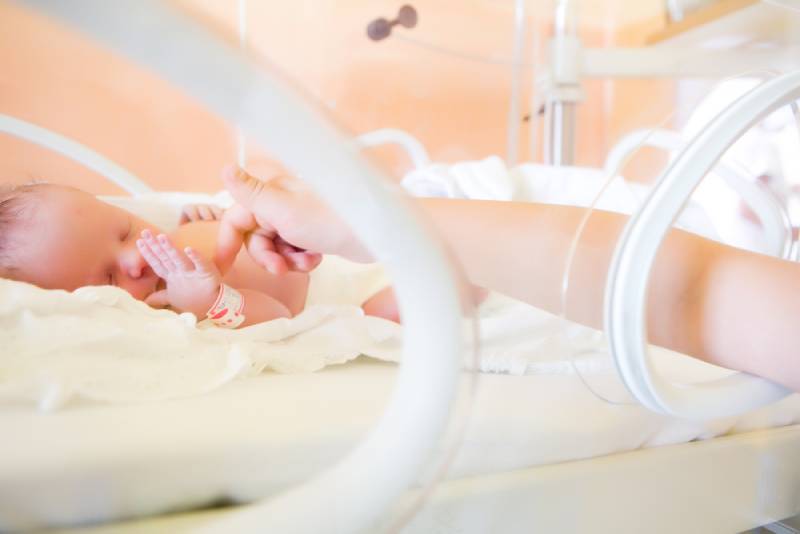The days leading up to a baby’s birth are filled with excitement and anxiety for both mom and dad, and they can’t wait to hold their new baby in their arms.
But things can quickly take a different turn if the baby is admitted to the NICU.
The NICU, short for “neonatal intensive care unit”, is a unit within the hospital where doctors take care of the needs of premature babies, as well as babies who were born with some kind of illness that needs to be treated right away.
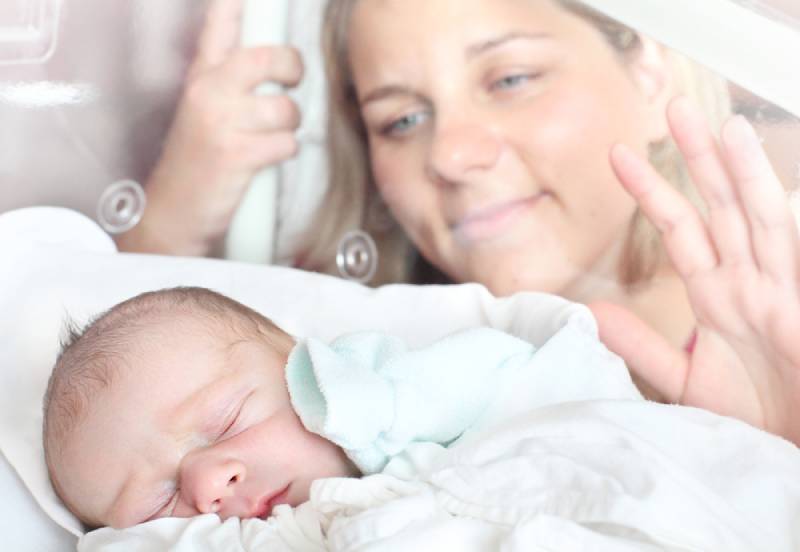
If your baby is staying in the NICU, you probably have a million questions going through your mind, ranging from why this has happened to what to expect during your baby’s NICU stay.
You’re also probably curious about all the medical equipment that you can see in the room, what it’s used for, and who can visit your baby.
I find that the more you know, the less you worry, so I will take you through all the different aspects of your baby’s NICU stay and, hopefully, ease some of your concerns!
Why is my baby in the NICU?
After your new baby arrives, all you probably want to do is take her home where you can enjoy those first precious days of her life.
Unfortunately, this isn’t always possible, as many NICU parents know.
There are many different reasons why your baby could be admitted to the neonatal intensive care unit, so let’s see what some of them could be.
1. Your baby is a preemie
Preemies, or babies who are born prematurely, are born before 37 weeks of pregnancy.
This is one of the most common reasons why a baby is sent to the NICU, as premature infants need special care during this time, unlike full-term babies.
According to the American Academy of Pediatrics, from 11 to 13 percent of births in the United States are premature.
If you are pregnant with twins or triplets, for example, you have a much higher chance of a premature birth.
While staying in the NICU, the baby will be placed in an incubator which makes sure that your baby stays warm as she develops.
Since a premature baby’s care is quite complex, your little one will be looked after by an entire team of hospital staff.
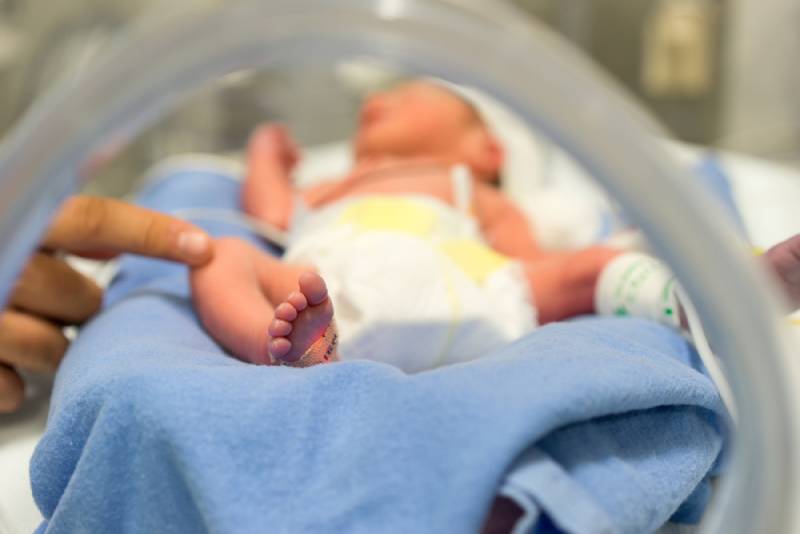
The physician who will be responsible for your baby’s needs is called a neonatologist, which is a pediatrician who has completed additional training to make him or her specialized in treating infants.
He or she will decide the course of treatment for your baby, and there is usually one neonatologist available every hour of the day in case there are complications.
Another member of the team is the neonatal nurse practitioner (an NNP). This is a registered nurse who is specialized in treating infants.
Other members of your baby’s care team can include a neonatal physician assistant, a resident, a hospitalist, a pediatrician, a respiratory therapist, and a neonatal fellow.
As you can see, premature babies are well taken care of, with an entire team of people to track their progress!
2. Maternal chorioamnionitis
If the mom is experiencing health issues, then that could also result in the baby being sent to the NICU.
Chorioamnionitis is a condition where the umbilical cord and the placenta become inflamed and infected because the mom has a bacterial infection.
Sometimes the mom doesn’t have any symptoms, but in some cases, she might have a fever, experience sweating, unusual vaginal discharge, a tender uterus, and have a very fast heartbeat.
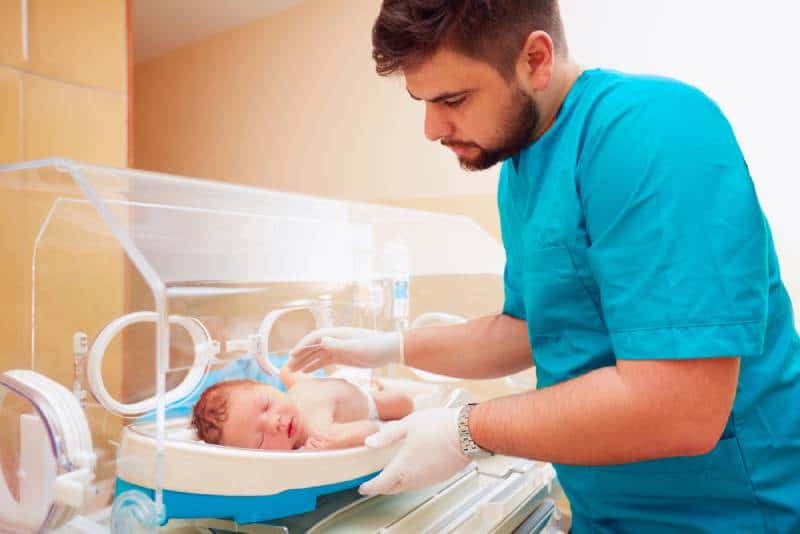
As a result, the baby can get infected, too, which is why she will stay in the NICU and be given antibiotics before her parents are allowed to take her home.
Chorioamnionitis is more common in premature births, but it can also happen in pregnancies that are carried to term.
Treating the baby as soon as possible is very important since an untreated infection could cause more severe health issues such as meningitis or pneumonia.
3. Respiratory Distress Syndrome
Respiratory distress syndrome (RDS) is another disorder that affects preemies more than babies who are carried to term.
The reason why it affects premature babies more lies in their lungs, which are underdeveloped and can’t expand enough to allow the baby to breathe properly.

In most cases, the baby will show symptoms of RDS within a day of being born.
Since oxygen is crucial, babies with RDS will be moved to the NICU where there are machines that can support their breathing until they are healthy enough to do so on their own.
What to expect in the NICU
Seeing your baby be admitted to the NICU can be nerve-wracking, but reading up on what a stay in this unit entails can help you feel better prepared for what’s coming in the weeks or months ahead.
During this time, the hospital staff will be your first point of contact, so don’t hesitate to approach them with any concerns that you might have!
1. Who can visit your baby
When a baby is admitted to the neonatal intensive care unit, most parents want to know how long will she stay there and when can they take their baby home.
Of course, the answer will vary based on your individual circumstances and why your baby was admitted to this unit in the first place.
In some instances, a baby can spend a few weeks in NICU care, while another baby might just need to stay there for a couple of hours or a day or two.
Your neonatologist will be your go-to person during this period, as they decide what kind of treatment your little one needs and will know how long your baby needs to stay at the hospital.
You’re also probably wondering who gets to visit your baby during this time.
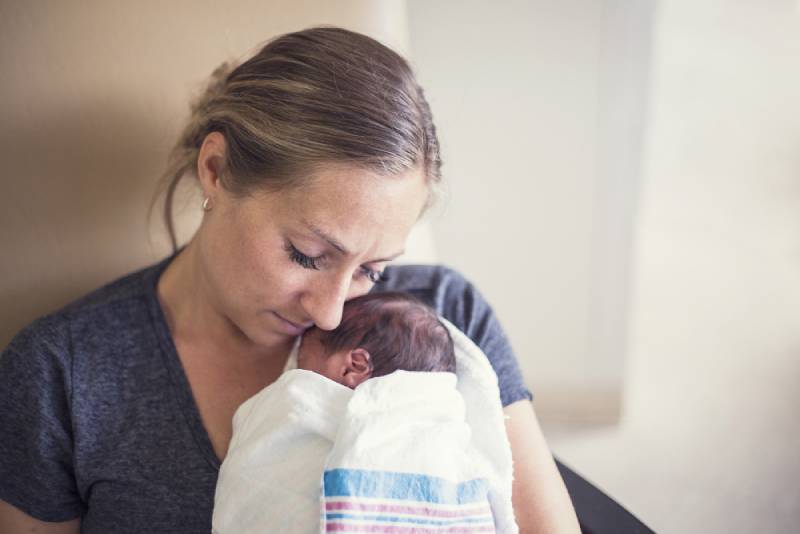
Naturally, the parents are allowed to visit their little one. But apart from the parents, other family members will also want an opportunity to meet the newest addition to the family.
Most of the time, extended family is allowed to visit, although they’ll have to come in during specific hours.
Hospitals also have rules with regards to how many family members are allowed to visit at one time, so this is something you should check as well.
If other children would like to visit the unit, they should be in good health and also be vaccinated.
There might also be rules regarding clothing, so be prepared to put on a mask, a pair of gloves, or even a hospital gown.
Hygiene is also really important in the NICU, so all visitors should give their hands a good wash to minimize the chances of spreading bacteria.
2. Feeding your baby
Remember, just because there are numerous health care providers taking care of your baby, doesn’t mean that you have to stand by and watch.
You can also take part in feeding your baby, just make sure to discuss this with the hospital staff first.
Your baby’s nurse, for example, can give you many useful tips on how to care for your baby while she’s at the hospital.
For example, there are different ways that you can feed your baby while she’s in the NICU.
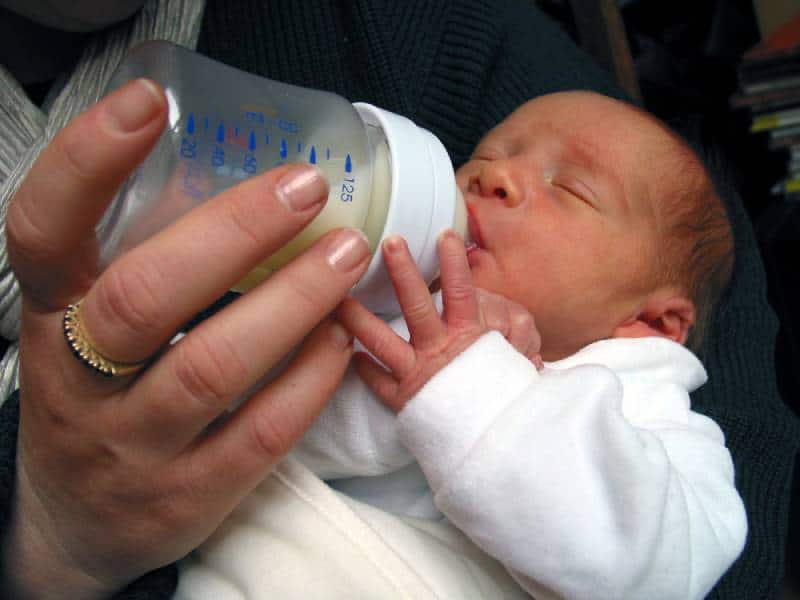
Some babies can be breastfed directly by the mom, or a pump can be used to express breast milk and feed it to the baby with a bottle.
Even if you’re a new parent who has never encountered a breast pump before, you can talk to a lactation consultant who will help you learn how to use one.
Babies in the NICU can also drink baby formula from a bottle.
Then there are also babies who have to be fed through a feeding tube that goes directly into their tummy. Both formula and breast milk can be fed to the baby in this way.
3. Holding your baby
Getting skin-to-skin contact is so important for parents to bond with their little one, but this can get difficult when the baby spends most of her time in an incubator.
One method of holding the baby while she’s in the NICU is “kangaroo care”, which means that the mom or dad hold the baby against their bare chest, allowing for skin-to-skin contact.
When you’re holding the baby close like this, she will feel safe and warm, but remember to cover her with a blanket as well.
You will also discover that kangaroo care can make you feel better, since holding your baby close will lower your stress levels and deepen the bond you feel with your little one.
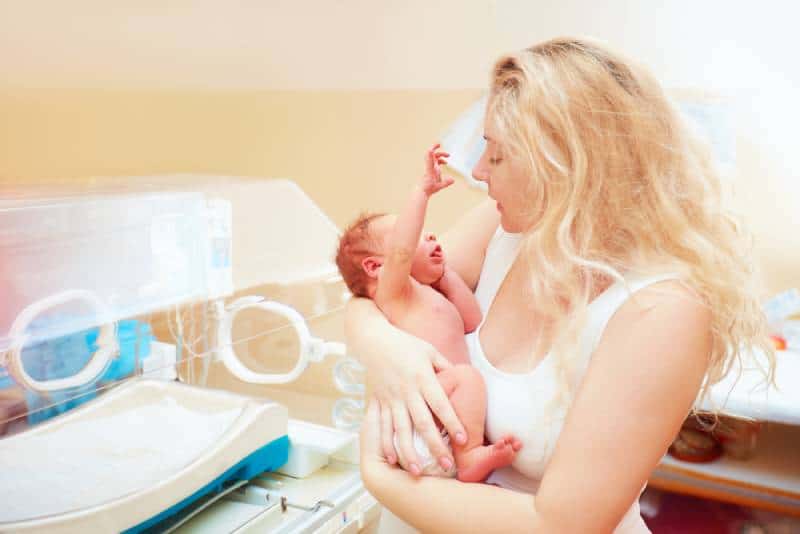
When mom is holding the baby like this, it can help increase the milk supply too.
What’s more, kangaroo care helps the baby’s weight gain, which is really important if your baby was born prematurely.
That being said, if it’s too soon to hold your baby, you can slowly place one of your hands on her head and the other on her tummy or feet.
This is called a hand hug (but some people refer to it as hand swaddling or a containment hold).
When you do a hand hug, though, remember not to stroke the baby since she could get upset and overwhelmed.
4. The equipment
Stepping into the NICU can be very overwhelming for the parents, considering the sheer amount of medical equipment they’re surrounded with.
That’s why knowing as much as possible about each piece of equipment will help ease your concerns!

Here are some of the machines you’re likely to come across while your baby is staying in the NICU:
- Blood pressure monitor – measures the pressure at which the baby’s blood is pumping;
- Apnea monitor – detects irregularities with the baby’s breathing and alerts the staff;
- Bili lights – used for phototherapy to treat jaundice;
- Mechanical ventilator – a breathing machine which helps the baby breathe by sending oxygen through a tube;
- Incubator – regulates the baby’s body temperature by keeping her warm;
- Cardiopulmonary monitor – measures the heart rate and breathing rate of the baby, and notifies the staff of any changes.
While seeing your baby surrounded by all of this machinery can be very upsetting, try to remember that these devices are here to provide the constant care and monitoring that your baby needs to get healthy and be able to go home with you!
5. Going home
While going home with your baby for the first time is exciting, it’s natural to feel anxious about being on your own when it comes to taking care of your baby.
After all, the first few weeks or months of your baby’s life were in a hospital, with doctors and nurses close by to help if anything went wrong.
With them out of the picture, you might feel afraid of what could happen at home!
The good news is that by the time your little one is discharged from the hospital, you will already know all there is to know about caring for your baby.

For example, the NICU staff will allow you to do more of the diaper changes, feedings, and so on. This way, you’ll become accustomed to it and your confidence will grow.
You will also receive a schedule of follow-up appointments with doctors, so they can make sure your baby is progressing well at home.
Once you’re home with your baby, it might take some time to adjust, so don’t be shy to ask your family or friends for help if you need it.
For instance, they can run to the grocery store if you need anything, or help you do the laundry.
To wrap up
Emotionally speaking, realizing that your baby will have to stay in the NICU can be incredibly difficult.
Any plans that you might have had for your baby’s arrival get turned upside down and you need to adjust to a new reality where you spend a lot of time at the hospital.
That being said, you can rest assured that your baby will have the best possible care in the NICU.
And before you know it, you’ll be bringing her home with you, safe and sound!
References:
American Academy of Pediatrics. N.D. “Preemie.” Healthy Children.
RELATED: Everything You Need To Know About NICU Levels
Like this article? Please share or pin it for later. You can also stay in the loop and follow us on Facebook, Instagram and Pinterest.

This post contains affiliate links. Please see our full disclosure for more info.

